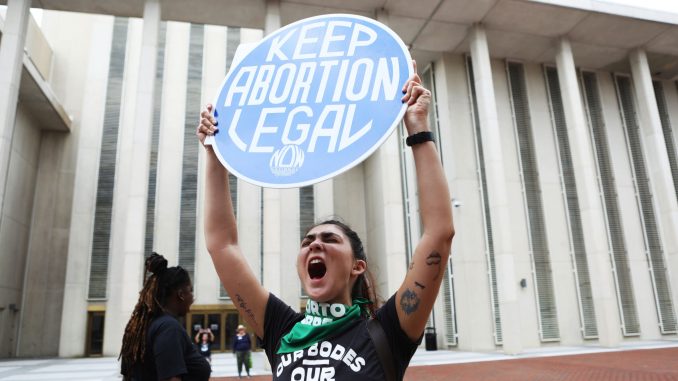
A ballot initiative OK’d by the Florida Supreme Court perpetuates abortion advocates’ favored strategy of using vague definitions of “health” to expand abortion on demand.
Florida voters will face a referendum measure in November that would allow abortion up to the moment of birth if deemed “necessary to protect the patient’s health” after the state Supreme Court’s decision on Monday allowing the measure on the ballot.
Amendment 4, the so-called Amendment to Limit Government Interference With Abortion, is being pushed by a pro-abortion political committee, Floridians Protecting Freedom.
The proposal’s vague definition of “health” is similar to that of the U.S. Supreme Court’s 1973 decision in Doe v. Bolton, which defined “health” of the mother as “all factors” affecting the woman.
The Supreme Court held in Roe v. Wade that same year that states could issue no regulations for first-trimester abortions and some regulations for second-trimester abortions, but only for the purpose of protecting the “health” of the mother. In the third trimester, when the unborn child is viable, the since-overturned Roe allowed states to make abortion illegal contingent on the existence of exceptions to protect the mother’s life and “health.”
Doe v. Bolton, the lesser-known case decided on the same day as Roe, defined the “health” of the mother as “all factors” that affect the woman, including “physical, emotional, psychological, familial, and the woman’s age,” drastically expanding the allowable abortions legalized by Roe.
Florida’s Amendment 4 similarly would prohibit restrictions on abortion when “necessary to protect the patient’s health, as determined by the patient’s health care provider.”
The proposal would circumvent current state law protecting unborn children with a heartbeat. On the same day the Florida court approved the ballot initiative, it upheld a state law protecting unborn children from most abortions after 15 weeks, enabling a six-week abortion ban approved last year to take effect on May 1. Republican Gov. Ron DeSantis signed the six-week ban into law last April, but it couldn’t take effect unless the 15-week ban survived legal challenges in the state Supreme Court.
Because the text of the constitutional amendment contains no definition of “health” or “health care provider,” the measure would likely legalize abortion at any stage of the pregnancy if anyone who claims medical expertise asserts the mother would benefit from it physically, emotionally, or otherwise.
Florida statutes define a health care provider as “a physician licensed under chapter 458, an osteopathic physician licensed under chapter 459, a podiatric physician licensed under chapter 461, or an advanced practice registered nurse registered under 464.0123.” If it receives 60% of the vote in November, the ballot initiative would allow any doctor, osteopath, podiatrist, or nurse to determine if a woman’s health could in any way benefit from ending the life of her unborn child.
Michigan voters legalized abortion up until birth with similarly vague language in a November 2022 ballot initiative. Proposal 3 prohibited laws against abortion if a “health care professional” deemed it to be “medically needed to protect a patient’s life or physical or mental health.”
Broad and unclear definitions of health have allowed half a century of violence against the unborn after Doe v. Bolton, and have ended thousands of lives in Michigan with the passage of Proposal 3.
In November, Florida voters will have the chance to stop another vague definition of health from turning the Sunshine State from one of the states with the most protections for the unborn to the most pro-abortion state in the South.

